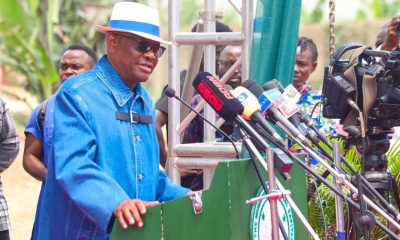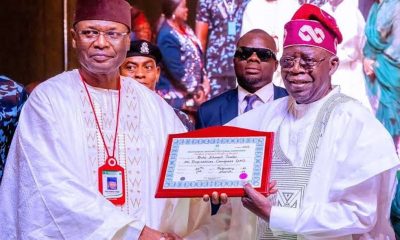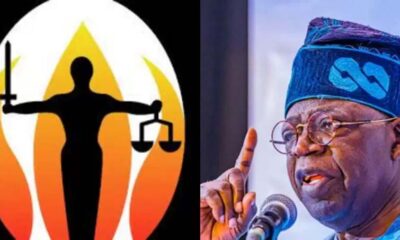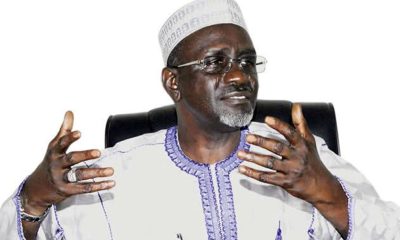Opinion
The abduction of Pa Reuben Fasoranti (OPINION)

By Festus Adedayo
In 1996, his car riddled with bullet holes inflicted by General Sani Abacha’s goons aimed at assassinating him, Yoruba Afenifere Leader, Senator Abraham Adesanya, had made a bullseye statement. That statement appeared to explain the raging furore among the leadership of the pan-Yoruba socio-cultural group today.
Adesanya’s father had 20 children. He was the only one initiated into the awo secret cult by the older Adesanya. As such, Senator Adesanya was known to be highly fortified with the powers of his ancestors. It was a time when the demonic Nigerian state under Abacha sought to wipe out any dissent to its infernal rule.
The then Lagos police commissioner had inspected the spatter of bullet holes on Adesanya’s car and concluded that no human being could have survived that assassination attempt. Alarmed and apprehensive of further associating with Adesanya, his driver, who survived the assassination attempt with him, had immediately eloped, sacked himself from Adesanya’s employ, fearful for his life. When told of his driver’s abscondment, Adesanya was said to have retorted in Yoruba that Omode lo’n se e. O ye ko mo wipe bi agbe o ba fo, omi inu re ko le danu – he is being childish; otherwise, he would have realized that if the gourd does not break, the water inside it cannot be spilled.
Last week, the gourd of Yoruba leadership broke – or was broken – and the water has since spilled like a burst cistern. The forceful break of the gourd however has a consistent tragic trajectory. The destruction of the gourd has a consistency in the recent hitorico-political tale of the Yoruba. The gourd was forcefully broken by the same evil dramattis personae, political merchants and vultures, who have consistently sought an option reminiscent of biblical Samson’s – to crumble a house that has proved impenetrable to their attempt to make it a house of Mephistopheles.
Since the founding in London in 1945 of the Egbe Omo Oduduwa, the progenitor of Afenifere, by Yoruba leaders – Adeyemo Alakija, president; Yekini Ojikutu, vice president; Obafemi Awolowo, General Secretary and others like Akinola Maja, Oni Akerele, Akintola Willliams, Saburi Biobaku, Abiodun Akerele, D.O.A. Oguntoye, Ayo Rosiji and others – five persons have made futile attempts to destroy this Yoruba foremost leadership organization and its Afenifere mutation.
The first anvil of its destruction was Nnamdi Azikiwe. Though his attack on the leaders of the Egbe preceded its founding, the tribal tension in the Nigerian Youth Movement (NYM) was Zik’s – as he was fondly known – opportunity to sound a death knell on Egbe Omo Oduduwa, the first major attempt at unity by the Yoruba. The Egbe had huge prospects to unite these people who had, for centuries, splintered in discord like the seeds in a walnut pod.
In the February 1941 split in the NYM over the contest for the Legislative Council seat between Samuel Akisanya (who later became the Odemo of Isara) and Ernest Ikoli, erstwhile Daily Service editor, Zik and his West African Pilot newspaper pitched their tents with Akisanya. Yoruba leaders queued behind and voted for Ikoli. This generated further tension between 1946 and 1948 in the NYM, eventually and effectively leading to the death of this anti-colonial government movement.
Azikiwe didn’t hide his disdain for the Egbe and its leaders. Indeed, Egbe Omo Oduduwa had not been formally inaugurated by the time Azikiwe’s NCNC, in December 1947, sponsored protest demonstrations against it, using the editor of the Pilot, F. O. Coker, as the peg of the protest. Zik and his party, the NCNC, went on to form the Yoruba Federal Union (YFU) as a counterpoise to and as such, weaken the Egbe. This was at a time of growing solidarity among the Yoruba. Zik and his crew launched the YFU on June 12, 1948, at Glover Hall, Lagos but were so tactless as to make the speakers at the inauguration be Azikiwe himself, Mbonu Ojike, a known Zik apostle and columnist in the Pilot, as well as Oged Macaulay, a known Zik ally. The YFU however suffered the fate of all politically concocted contrivances – it faded out.
Zik would however not relent. Deploying a weekly newspaper called Ijebu Weekly Echo to achieve their aim, Zik and his group pilloried the Egbe headed by Sir Adeyemo Alakija. Bitter, crude and vulgar personal insults were splashed on them by Igbo, mainly residents of Lagos, using such words as “bane of our age,” “a nihilist, totalitarian, fascist organization,” as well as “dirty exhibition of egocentric stupidity, ethnocentric arrogance and capitalized idiocy” on the Egbe Omo Oduduwa. This was followed by an incendiary editorial comment in the Pilot of September 8, 1948, which said, “Henceforth, the cry must be one of the battle against Egbe Omo Oduduwa, its leaders at home and abroad, uphill and down dale, in the streets of Nigeria and in the residences of its advocates… There is no going back until the Fascist Organization of Sir Adeyemo has been dismembered.” Osita Agwuna, a leading Zikist, after his conviction for sedition, had written an open letter he entitled “To all the people of Nigeria and all Zikists” where he advocated attacks on the Egbe.
The second attack on the Egbe was led by the mercurial Adegoke Adelabu, an acolyte of Zik. Though his disdain for both Awolowo and the highly perceived Ijebu people-dominated Egbe was historical, the incendiary age-long intra-ethnic fissure and struggle for power between the Ijebu and the Ibadan was the peg. By the 19th century, Ibadan had become a very potent military force but its prowess was crippled by the embargo placed on the importation of guns and powder on their routes by the twin nations of Ijebu and Egba. Peeved, Ibadan, in the rainy seasons of 1877, matched out its military arsenal against the Ijebu and Egba, with the aim of forcing open their roads to the coast and conquer, as well as absorb, their territories into Ibadan. Unfortunately, this expedition failed and the Egba and Ijebu thereafter aligned with all enemies of Ibadan like the Ilorin, reflected in the treaty of 1886 signed to recognize the independence of the Ekitiparapo. Even after this, their mutual hostility continued. The Ijebu distrusted and feared the Ibadan. These pre-colonial polities and realities gestated into and found their way to the founding of the Egbe Omo Oduduwa.
Ibadan elites, preening themselves as warriors who would not play second fiddle to the Ijebu, rallied around to thwart the emergence of Awolowo as the modern-day dominant power. They created a counterpoise to the Egbe which they called Egbe Omo Ibile, Society for Native Sons, and appointed as leader, Adegoke Adelabu, The Ibadan Egbe later coalesced into the Ibadan Peoples Party (IPP) or the Mabolaje. The sub-ethnic threat from the IPP to Awolowo’s Egbe was so intense that, apart from the cross-carpeting of five IPP House of Assembly members to the side of the Action Group which ensured that Awolowo’s AG formed the cabinet in 1951, the IPP subsequently won the 1954, 1956 and 1959 elections. A death knell on the Ibadan advocacy however came in the commission of enquiry into the affairs of the Ibadan District Council which indicted Adelabu of financial malfeasance and eventually his death via car crash in 1958. This led to an intra-national uprising in Ibadan, with Mabolaje splintering into the Mojid Agbaje and Adisa Adeoye factions. Both groups however failed to muster enough opposition to the AG and Egbe Omo Oduduwa which eventually swallowed them.
Erstwhile editor of the Daily Service, a lawyer and polemicist who took up the newspaper’s editorship from Sese Ikoli, Chief S. L. Akintola, was the third architect of the plot to destroy Egbe Omo Oduduwa. Akintola had come into journalistic prominence by launching one of the most visceral attacks on Azikiwe’s claim of an attempted assassination on him. As editor of the Service, Akintola cut the ground from under the feet of Zik when he published the whole pamphlet alleging Zik’s assassination in one issue of the newspaper with the title, Assassination de luxe, price one penny. In the thick of the AG rump’s attempt to remove him as Premier, Akintola also formed a counterpoise to the Egbe Omo Oduduwa which he called Egbe Omo Olofin, Olofin being one of the cognomens of Oduduwa.
Named at first Egbe Omo Yoruba and later on, Egbe Omo Olofin, the major undisguised aim of the group was to finally destroy Awolowo who was by then serving a ten-year jail term in Calabar prisons. This Egbe was conceived by political arch-enemies of Awolowo and new converts who believed that his jailing had put a wedge on his relevance. Some of the coupists were the former Administrator of the Western Region in the Emergency year, Dr. M. A. Majekodunmi, who was personal physician to the Prime Minister; Chief H. O. Davies; some high court judges and traditional rulers. Some leaders of the Awolowo’s Egbe were also seen in the new Egbe, Members of the new Egbe then issued a press release where they castigated Awolowo after their maiden meeting held on January 3, 1964.
The fourth threat to the pan-Yoruba socio-political group came from a man known as the Arole AwolowoIo, Awolowo’s heir, Chief Bola Ige. His loss in the Wednesday, January 27, 1999, electoral college of the Alliance for Democracy (AD) held at the D’Rovans hotel in Ibadan threw up the messy tussle in the fold of the political children of Awolowo. At the end of the exercise, Ige got nine votes as against 14 for Chief Olu Falae. Since that election, Afenifere and the post-Awo leadership of Yorubaland have never been the same again. Though he disguised his roiling anger at the Ijebu Four – Olaniwun Ajayi, Ayo Adebanjo, Abraham Adesanya, and Pa Onasanya – with the claim that he was “gaudily joyful” at Falae’s emergence, Ige’s actions and utterances thereafter showed that he was poised for a fight with the mafia. One of the things he did was to get his long-time friend and fellow Ijesa Yoruba, Justice Adewale Thompson, to form the Yoruba Council of Elders (YCE) to rival and indeed factionalize Afenifere. Alajobi, a group headed by Bishop Emmanuel Gbonigi’s intervention couldn’t stop the derailment. After Ige’s assassination, the crisis metastasized, so much that Afenifere was broken into two factions, one headed by Fasoranti who had been handed the leadership of the group after Adesanya fell ill and Ayo Fasanmi, Ige’s friend. By the time of his assassination in 2001, Ige left a Yoruba land that was roiling in leadership crises.
The fifth threat to the Afenifere and the quest of the Yoruba is Bola Ahmed Tinubu. Using his singular win in the 2003 governorship election and the loss of his AD colleagues in the west as the propelling force, Tinubu immediately began what ostensibly was the reunification of Yoruba politics under his roof. It was however a veneer for his presidential and prebendal ambition. Deploying a huge war chest of resources of his Lagos State, he funded virtually all political activities in the region, literally heaving all his ex-AD governor colleagues, except Adebayo Adefarati, inside his pocket. By then, it had become clear to him that the Afenifere mafia who collectively ensured his emergence against Funsho Williams in 1999 would fight him to a standstill, having fallen out with him.
With all he had, Tinubu battled this Yoruba leadership hegemony, infiltrating their ranks and creating a counterpoise, the Afenifere Renewal Group (ARG). At Fasanmi’s death, his group appointed Senator Biyi Durojaiye as Afenifere leader to further delegitimize Fasoranti’s leadership. When Durojaye also died, the Tinubu group appointed another Afenifere leader. With the support of his governor colleague, Bisi Akande, who had become his bag carrier, Tinubu dismantled the AD which was the most impregnable political base of the Afenifere socio-political group, formed the Action Congress, later with Atiku, and which, in 2013/2014, went into alliance with the ultra-conservative north to form today’s All Progressives Congress (APC).
In the build-up to the 2023 presidential election, there has been a frenetic scavenging by candidates for ethnic legitimacy as affirmation of their bids. Peoples Democratic Party (PDP) candidate, Abubakar, began the forage when he asked his kin at an Arewa event in Kaduna to vote for him. Being a northerner, he told them, he was the most suited to know where the shoe pinched the region. Southeast is already agog with Peter Obi. His presidential bid is almost an obsession for a region which sees in his presidency the first opportunity for a “highly vilified” Igbo stock to come back to the mainstream.
Until the Akure fiasco, Tinubu wore the Olusegun Obasanjo visor of 1999. In that year’s presidential election, a high chunk of Yoruba leadership openly disclaimed Obasanjo who was seen as a Yoruba enemy. This antagonism led to Obasanjo’s election by “outsiders”. Frustrated by the prospect of a repeat of the route Obasanjo trod, Tinubu’s desperation to procure Yoruba leadership legitimacy, no matter how crooked or brimming with fraud, becomes understandable.
His recent visit to the Akure home of Pa Reuben Fasoranti has been generating a lot of seismic comments. Like Michael Adekunle Ajasin and Abraham Adesanya before him, Fasoranti had ceded his headship of Afenifere to Adebanjo almost two years ago when it became clear that age would impede his leadership. This same Fasoranti was fought to a standstill by the Tinubu group whose goal was to make his leadership inconsequential. Most of the pilgrims with Tinubu to Akure were conscripts of the coup that unsuccessfully delegitimized Fasoranti and serially appointed renegade leadership for Afenifere.
Tinubu, acting as if coerced to go pay this same man a condolence visit after his daughter was brutally killed by Fulani herdsmen, literally urinated on the balcony of the Yoruba leader. In an attempt to deflect arrows shot at Muhammadu Buhari’s marauding, bloodthirsty kin, Tinubu had asked “where are the cows?” He similarly exhibited such conceit to highly respected Chief Olu Falae during the invasion of his farm by Fulani herdsmen.
The Akure pilgrimage was an abduction of 96-year-old Fasoranti by elements who spent over a decade undermining his Yoruba leadership. They took advantage of Baba’s advanced age and the suspicious company of turncoats who enveloped him to get Tinubu to reap where he did not sow. The coup reeked of corruption, abduction, and coldblooded execution of a most clinically infernal hijack of ‘power’ in Yoruba history. It was originally convoked by a group of hungry lay-about who went by the name Conscience of Yoruba Nation, a name reminiscent of a Babangida era ragtag military apologia crusade which was masterminded by a man who claimed to be driven by conscience but whose spineless interventions brimmed of a ‘conscienceless conscience’ even as he sought to grease his esophagus from crumbs that fell off Babangida’s table. In Akure, that Conscience of Yoruba Nation gathering was then criminally labeled with the mis-biology of an Afenifere endorsement of Tinubu.
The fraudulence of the whole enterprise was to be revealed when the coupists issued a communiqué, not under the conscienceless banner with which they invited conferees to Akure but Afenifere. Respected Prof Akin Onigbinde said that not only was the assemblage “essentially a gathering of chieftains of APC in the South West,” many of them couldn’t claim linkage to Afenifere nor did they attend its meetings in the last ten years. They were just interested in the spoils of dollars allegedly left after the disastrous show. They then added a disgraceful icing on the cake of the infamy when they concocted a Fasoranti claim that he had taken over the headship of Afenifere which he vacated almost two years earlier. This lie thrived for a few hours, landed with a thud thereafter and scattered into smithereens.
Instead of going through the futile attempt to abduct Afenifere and its leadership, I wonder why the group behind this penkele mesi – the offerees and offerors of legitimacy – did not deploy ARG for the legitimacy-hunting game; or simply create a brand new organization. That would have been neater in this last-minute tan’na w’ebi – grope in the dark for kin – that they are engrossed with.
Opinion
Barbaric mass burning of innocents in Edo, by Farooq Kperogi

Barbaric mass burning of innocents in Edo, by Farooq Kperogi
I woke up on Friday morning to a deluge of forwarded, unwatchably terrifying videos showing 16 Hausa hunters, who were traveling from Port Harcourt to Kano for the forthcoming Eid-el-fitr festivities, being lynched and burned alive by a mob of blood-thirsty savages in the town of Uromi in Edo State. I’ve been sick to my stomach.
My inquiry has led me to understand that the Uromi community has been gripped by abductions for ransom, which sometimes result in deaths. Seething with rage and vengeance over the incessancy of deadly kidnapping by “Fulani herdsmen,” the community was primed for jungle justice.
When local vigilantes accosted a bus traveling northward through the town, they found Hausa hunters armed with hunting guns and machetes aboard. In the bigoted, know-nothing estimation of the Uromi vigilantes, Hausa hunters were one and the same as Fulani kidnappers.
So, they burned the innocent Hausa hunters for the crimes of anonymous Fulani bandits. I honestly couldn’t bring myself to watch the dreadfully nightmarish videos to the end.
These sorts of savage slaughters of innocents persist in Nigeria not just because of a progressive loss of faith in formal institutions for the redress of communal grievance, heightened anxieties about safety, and increasing faith in the efficacy of jungle justice but also because of the absence of consequences for them.
As I pointed out when Deborah Yakubu was extrajudicially murdered by a mob of unhinged fanatics in Sokoto in May 2022, there is no greater enabler of jungle justice than a lack of consequence for it.
Sadly, when tragedies like this occur, there is a habitual, safe, standard, prepackaged rhetorical template that people in government effortlessly regurgitate. They promise to bring the perpetrators to justice, make performative arrests to quench public thirst for justice, and nothing else happens. That can’t continue.
When I called for the prosecution and public execution of the murderers of Deborah in 2022, I warned that it was necessary “to serve as an example to other would-be murderers.”
READ ALSO:
- Investigation of wanted businesswoman Achimugu not linked with Atiku, Sanwo-Olu – EFCC
- No Sallah durbar festival in Kano this year – Police warn
- $100m coin collection buried for decade to be auctioned
Of course, Deborah’s murder wasn’t the first example of jungle justice. Harira and her four children were ferociously murdered by maniacal thugs in Anambra State, and nothing was done about it. The list is too long to fit in a newspaper column. But I argued that it’s never too late to do the right thing.
I will repeat my plea. The murderers of these innocent travelers are easily identifiable from the videos that are circulating online. They should all be apprehended, tried, and executed in public to deter a repeat.
But, in the interest of proportionality of justice, this should not be limited to this Uromi incident. All cases of jungle justice should equally be punished the same way. The punishment for murder in both the Criminal Code and the Penal Code is death. The law should be followed.
Another thing that this incident instantiates is the danger of toxic ignorance. Before Muhammadu Buhari became president, all northerners in southern Nigeria used to be “Hausa,” irrespective of their ethnic and religious identities.
After Buhari became president, every northerner, especially if the northerner is also Muslim, became “Fulani,” which led me to write a June 5, 2021, column titled, “‘Fulanization’ of the North by the South.” The South, I wrote, was relentlessly rhetorically Fulanizing the North, particularly the Muslim North, just to fertilize and sustain a simplistic narrative.
This simplistic, misbegotten narrative probably led the Uromi mass murderers to assume that Hausa people with hunting instruments must be Fulani bandits since they have internalized the wrongheaded notion that all northern Muslims are “Fulani.”
Never mind that Hausa and Fulani communities in many northwestern states are at daggers drawn over kidnappings for ransom by Fulani outlaws, or that more northerners are kidnapped for ransom than people anywhere else in the country.
Trust TV, the broadcast arm of Daily Trust, did an informative documentary on March 5, 2022, titled “Nigeria’s Banditry: The Inside Story” that brought the tension between Fulani herders and Hausa people into focus.
A subsequent July 25, 2022, BBC Africa Eye documentary titled “The Bandit Warlords of Zamfara,” which got the hackles of the Muhammadu Buhari administration up, amplified the tensile relational dynamics between Hausa and Fulani communities in the northwest since kidnapping for ransom took roots in the region, transmuted into full-on terrorism, and finally morphed into the full-scale Hausa-versus-Fulani ethnic war, particularly in such states as Zamfara, Kebbi, and Katsina.
In response to the rural and urban banditry by mostly Fulani brigands against Hausa people in the northwest (Fulani people have also accused Hausa people of cattle theft, indiscriminate murders, and systematic exclusion), the BBC documentary tells us, Hausa people formed or strengthened preexisting vigilante groups called yan sakai or yan banga for self-defense against bandits.
READ ALSO:
- EFCC re-arraigns son of ex-PDP chairman for alleged N2.2bn oil subsidy fraud
- Group says Natasha’s recall will deepen democracy
- We welcome Gov Makinde’s U-turn on Shari’ah panel – MURIC
Yan banga groups originally come from traditional Hausa hunters’ associations and draw upon the skills and rituals commonly associated with traditional hunters (such as using charms, dane guns, and other traditional weaponry) for vigilante duties.
In other words, most of the Hausa hunters that the Uromi homicidal beasts murdered in cold blood to avenge the banditry of Fulani herders would be targets of elimination by Fulani bandits in the northwest. That’s double jeopardy.
The northwest is the theater of a ceaseless spiral of recrimination and reciprocal violence between the Hausa and Fulani communities, thereby imperiling the longstanding, Islamically-inspired ethnocultural synthesis that historically unites them.
Remarkably, this volatile dynamic persisted largely unnoticed by both national and global media until it was thrust into international consciousness through BBC Africa Eye’s seminal July 2022 “The Bandit Warlords of Zamfara” documentary.
The documentary revealed the paradoxical reality wherein, despite substantial overlaps in culture, religion, heritage, and linguistic traditions, the Hausa and Fulani populations remain predominantly segregated, particularly in rural areas. Intercommunity relations are characterized by persistent tensions that manifest in conflicts over scarce resources such as land, water, and sustenance.
But the rest of Nigeria has a hard time grasping the existence of tensile ethnic stress between Hausa and Fulani people in the north on account of banditry because the southern-dominated institutional news media in Nigeria, which help frame how we make sense of our social and cultural realities, lack ready-made, stereotypical mental representations with which to frame the conflict, so they either avoid reporting it altogether or minimize its horrors if they report it at all.
The news media thrive on Manichean binaries, conflictual differences, and sensation, which a conflict between Hausa and Fulani people doesn’t present. After all, a popular Yoruba epigram says, “Gambari pa Fulani ko lejo ninu,” which roughly translates as “If a Hausa person kills a Fulani person, there is no case,” implying that the Hausa and the Fulani are indistinguishable.
I have also read many northerners on social media encouraging a retaliation over the Uromi massacre of Hausa hunters. That would be most unfortunate for at least three reasons. First, the people who committed the murders are easily identifiable. Indiscriminate murder of innocent southerners in the north for a crime committed by a recognizably small group of people violates not just the law of the land but also Islamic precepts.
Surah Al-Ma’idah (Chapter 5, Verse 32) of the Qur’an says, “whoever kills a soul…it is as if he had slain mankind entirely. And whoever saves one—it is as if he had saved mankind entirely.”
Second, based on the experiences of the past, one can almost guarantee that innocent, law-abiding Igbos in the north would bear the brunt of any “retaliation” even though Uromi in Edo State isn’t an Igbo town.
The town is populated by the Esan people who, although they constitute a major ethnic group in the state, are not the majority in the state. They also don’t have a numerically significant presence in the North, so innocent southerners would be murdered in cold blood.
Finally, killing innocent southerners in the North for the crimes of a few people would be identical to the crimes of the Uromi vigilantes that the retaliators are supposedly avenging.
I hope the president and the governor of Edo State will act expeditiously to contain this upheaval and prevent it from snowballing into a bigger problem than it should.
Barbaric mass burning of innocents in Edo, by Farooq Kperogi
Farooq Kperogi is a renowned Nigerian columnist and United States-based Professor of journalism.
Opinion
How Wande Abimbola rejected IBB’s ING bait, and other stories (2)

How Wande Abimbola rejected IBB’s ING bait, and other stories (2)
Tunde Odesola
(Published in The PUNCH, on Friday, March 28, 2025)
Once upon a time in the land of Ìwásè, Orunmila, Yoruba god of Wisdom and Divination, thought to showcase Yoruba science, divination, arts and philosophy to mankind; so, he codified the four aforementioned essence of human existence into a body of knowledge called Ifa.
As science, Ifa embodies the study and prescription of herbal medicine for healing, with its practitioners being ‘babalawo’ or ‘iyanifa’ (male or female Ifa priests) and ‘onisegun’ (medicine men or women). Ifa, as science, unravels astronomy, time cycles, and energy balance in understanding cosmology – the science of the origin and development of the universe.
Ifa’s science is also contained in its corpus called Odu Ifa, a humongous collection of 256 voluminous books, passed down orally within Yoruba culture. The 256 books are a cornucopia of Ifa literature containing stories, poems, revelations, findings, assertions, songs, taboos, laws, etc that explain the Yoruba worldview on far-ranging issues of existential proportions. The vast 256 collections of voluminous books are divided into 800 sections, making the totality of the corpus 204,800 compendia of orature.
In the 256 Odu Ifa is the coded knowledge system called the binary coding found in computer science, and derived from mathematical probability, observation and pattern recognition. With this similarity, Ifa shows an amazing connection between ancient wisdom and modern technology. Abimbola says no other religion has more body of books, noting, however, that adherents of foreign religions in Nigeria erroneously throw away the science, arts, divination and philosophy of Ifa for imported religions that are not better. “Something is wrong with us,” he says.
He continues, “I am not a Christian, but I use western medicine when necessary – along with herbs and divination. You might not be an Ifa worshipper, but that shouldn’t stop you from benefiting from its truths, which are so natural and pure. The truths of Ifa are contained in its accurate divination, diagnosis, treatment and healing. The efficacy of Ifa explains why you find people of other religions sneaking to it in secret and benefiting from it while pretending publicly not to have anything to do with it.”
READ ALSO:
- FG declares public holidays for Eid-el-Fitr
- JUST-IN: Ex-Oyo gov Ajimobi’s first child Bisola dies At 42
- Crisis hits LagRide, drivers threaten protest as operators move to withdraw vehicles
The art of Ifa is seen in its rich poetic recitations, panegyrics, historic accounts, music, storytelling and symbolism, just as Yoruba sculpture, smithing, beadwork, weaving and many other art forms are believed to be inspired by the gods.
As philosophy, Ifa teaches moral and ethical wisdom symbolised by Orí (Destiny), Èsù (Choice and Consequence), Ìwà Pèlé (Good Character), Omolúàbí (Virtue), Owú (Jealousy), Ìbínú (Anger), and Ànìkànjopón (Greed), among other behavioral traits.
Through divination, Ifa offers insights into the past, interrogates present possibilities and reveals future prospects while prescribing solutions via sacrifice, rituals, offerings, or behavioral changes. Ifa divination involves an interactive engagement that gives room for guidance and encourages personal responsibility.
According to Abimbola, ‘writing is an enemy of remembrance’. What do you mean, sir? I asked. “The 256 Ifa corpus can be sectionalised into 800 large volumes. This means there are 204,800 volumes of verses, recitations, poems, stories, etc in the corpus. In prehistoric times, the whole of the corpus was crammed by Ifa students, but nowadays that they are in book form, people are forgetting them. That’s why I said writing is an enemy of remembrance. When I was in school, I didn’t jot down notes during lectures; I preferred to listen and understand first, and form my notes later, from my understanding. In writing my notes, I borrowed the notes of my classmates who had jotted down notes. My style gives room for deeper comprehension,” Abimbola explains.
The Araba of Osogbo, Chief Ifayemi Elebuibon, affirms the tenet of loyalty in Ifa corpus, reciting the Ìwòrì Bògbé verse during a telephone chat with me, when I asked for an esè Ifa that teaches loyalty.
Ogunwande exemplifies the loyalty displayed by the partridge in the Ìwòrì Bògbé verse of Ifa, which Elebuibon describes as the story of the partridge, who having wined and dined with the houseowner, will not desert the houseowner in time of trouble, “eyele kii b’onile je, ko b’onile mu, ko di ojo kan ijongbon, ko yeri.”
When MKO, the friend of his youth, came under political oppression after winning the June 12, 1993 presidential election, Abimbola stood by him like Jonathan stood by David in the Holy Bible.
Abimbola said, “Twice, they made me offers to head the Interim National Government. Firstly, I asked those sent by the military authorities if, after being sworn in as Head of State, I could pronounce that the election would be held afresh? Secondly, I dilly-dallied by saying the seven-month lifespan of the ING was too small to do anything. Thirdly, and morally, I couldn’t do that to a friend. Fourthly, and above all, I consulted Ifa, and Ifa told me in unmistakable terms to reject the ING offer.
READ ALSO:
- Rivers administrator Ibas fires Fubara’s political appointees
- Natasha: Murray-Bruce slams Atiku, defends Akpabio
- Tinubu shops for new INEC chairman for 2027 elections
“A few days after the offer was made to me, Abiola called a world press conference. We were all present at the conference where he announced the full results of the election. A day after the press conference, Ernest Shonekan was announced as the Head of the Interim National Government. I was happy I didn’t betray my friend. I would have regretted all the days of my life if I had accepted the offer.”
Named Ogunwande because his forebears were the spiritual heads of Ogun worshippers in Oyo, the Awise Agbaye says all the children of his grandfather and father bear Ogun in their names.
And, Ògún, the Yoruba god of Iron and War, was king over Irè, hence the appellation Ògún Ònírè. But Ògún wasn’t an indigene of Irè, a town in Ekiti; he only stopped by Irè-Ekiti on the way from an expedition with his men. Abimbola reveals Ògún was a native of Sakí, though he lived in Ile-Ife.
According to a myth, Ògún, thirsty and tired, came across some palm wine gourds as he passed through Irè. He stopped and lifted one of the gourds, hoping to quench his thirst. But the gourd was empty. He lifted the second, third and fourth gourds; all were empty. He became incensed and broke the four gourds and more, ordering that henceforth, empty gourds should be laid sideways while empty calabash for drinking should be placed face down. Ogun later rose to become the king of Ire.
The Ogun courage of Ogunwande came to bear when he thwarted the efforts of his fellow senators who attempted to fix their salaries during the Third Republic. He said, “As soon as we were inaugurated, senators began agitating to legislate and fix our salaries. As Majority Leader, I presided over intra- and inter-party caucus meetings. They said I should call a meeting for us to discuss the issue. I delayed by saying we should wait till the President and his ministers were sworn in before we discuss our salary.
“They would have beaten me up if not for the aura (òwò) innate in my personality. They would hear none of my advice. During one of our arguments over the issue, I asked some of them, “Are you here for money or service?” They looked at me in shock and asked, “If you’re not here for money, what are you here for? After some days of stand-off, I called a meeting of the elders of both parties – the Social Democratic Party and the National Republic Convention – and explained why I felt we shouldn’t fix our salaries.
“I said if we fix our salaries now and the President and his cabinet come in and fix their salaries lower than ours, are we not going to look greedy and stupid? When I said this, they saw reason with me. They said, ‘You should have explained it clearly like this. We shall wait’.”
Abimbola’s view on Yoruba bulletproof
All hell broke loose on November 26, 2020, a day the devil himself was appeased to drink water, and cease hostility. That date was an ‘ojo buruku, esu gbomimu’ day, when some suspected kidnappers shot the second-in-command to the gods of the land. It was the day the Olufon of Ifon, Oba Adegoke Adeusi, a first-class Ondo monarch, was felled by the bullets of assailants in Elegbeka community of Ose Local Government Area.
Abomination! No one sacrifices the child of Orè to Orè; ‘ai fi omo Orè b’Orè!’ The igbakeji orisa cannot be killed just like that, I thought. Shocked and sad, I called the Ooni of Ife, Oba Adeyeye Ogunwusi, to ask what happened to the efficacy of Yoruba bulletproof aka ayeta, if a first-class Yoruba oba could be gunned down just like that.
I grabbed my pen, scratched my head and penned the article, “Can African bulletproof stop AK-47 bullets?”, published in The PUNCH, on January 18, 2020.
In the article, the Ooni said the Yoruba had bulletproof ‘ayeta’ aka ‘odeshi’ for bullets. Ogunwusi said, “Everything has a name. If you call ‘ota’ (bullet) by its real name, it’ll deflect bullets from you. Even when the bullet hits its target, it won’t have any effect. This is why it’s called ‘ayeta’. But it has its taboos.”
Yoruba activist, Sunday Adeyemo, aka Sunday Igboho, supported the view of the Ooni, but a former Governor of Osun State, Prince Olagunsoye Oyinlola, who’s a retired Brigadier General, disagreed, saying there was no ‘ayeta’ for AK-47, a view supported by Elebuibon.
To be concluded.
Email: tundeodes2003@yahoo.com
Facebook: @Tunde Odesola
X: @Tunde_Odesola
Opinion
Tinubu as yesterday’s rebel and today’s tyrant, By Farooq Kperogi

Tinubu as yesterday’s rebel and today’s tyrant, By Farooq Kperogi
President Bola Ahmed Tinubu’s demonstrably unconstitutional suspension of the elected leaders of Rivers State and his illegal imposition of a retired military lickspittle as sole administrator in the exercise of his otherwise constitutional privilege to declare a state of emergency in any part of the country is the latest addition in a long list of instances of his embrace of the very things he once resented and fought against when he was outside the reins of federal power.
For example, he was brutally censorious of Goodluck Jonathan’s withdrawal of fuel subsidies in 2012. He expressed sentiments in writing and in speeches that resonated with the angst of the masses. He even helped finance a nationwide mass protest that so convulsed the country that Jonathan was compelled to back off his plans.
Yet, one of the first acts Tinubu did as a president in May 2023 was to announce an economically and socially disruptive withdrawal of fuel subsidies that has deepened poverty, annihilated the middle class, and ruptured the very fabric of Nigerian society.
Again, when Olusegun Obasanjo unconstitutionally suspended Plateau State’s Governor Joshua Dariye—along with state legislators— in May 2004 and appointed General Chris Ali as the state’s sole administrator, then Governor Bola Ahmed Tinubu of Lagos rightly called the act “illegal.”
“It is unfortunate and illegal,” he said. “This has to be discouraged. It is a bad precedent. What the president of the country has done, I pray it doesn’t stand.”
In fact, when Goodluck Jonathan declared states of emergency in the three northeastern states of Borno, Yobe, and Adamawa without suspending the elected leaders of the states, which I commended in a May 25, 2013, column titled “The Malcolm Xian Logic in Jonathan’s Praiseworthy Boko Haram Offensive,” Tinubu condemned it as unacceptable federal overreach.
READ ALSO:
- Communal Clash: Gov Adeleke imposes new curfew on Ifon, Ilobu communities
- BREAKING: IGP redeploys 38 police commissioners
- Osimhen breaks Odegbami’s Eagles goal record
“No governor of a state in Nigeria is the chief security officer,” he said. “Putting the blame on the governors, who have been effectively emasculated, for the abysmal performance of the government at the centre which controls all these security agencies, smacks of ignorance and mischief.”
He contended that Jonathan’s action “seeks to abridge or has the potential of totally scuttling the constitutional functions of governors and other elected representatives of the people” and that it would be “counterproductive in the long run.”
Given an opportunity to give materiality to the principles he espoused when he had no access to federal power, he has become indistinguishable from, and in many cases worse than, the objects of his erstwhile censure.
Tinubu now implements the same policies he once condemned and has become the same personality he once reviled. He exemplifies the aphoristic wisdom (often attributed to historian Ariel Durant or her husband Will Durant) that says, “Today’s rebel is tomorrow’s tyrant.” In Tinubu’s case, he was yesterday’s rebel and today’s tyrant.
Why do most people who initially invested symbolic and political capital in fighting against authority or oppression eventually become the very oppressors they once resisted? Why do firebrands and idealists often morph into the very thing they once denounced after assuming power?
The evidence of history shows us that resistance to tyranny can, and often does, end in new tyrannies. Critics of war or corruption frequently adopt those same practices when they find themselves in the circles of power.
So, this is beyond Tinubu as a person, who probably never really had any principles to begin with, whose resistance to past oppressive policies was probably mere calculative opportunism.
But why do previously genuinely adversarial people become the very things they once opposed with such regularity? Observers from psychology, philosophy, and political theory have long studied this phenomenon.
A previous column I wrote (and republished twice) on the psychology of power pointed out that “people under the influence of power are neurologically similar to people who suffer traumatic brain injury” and posited that situational, power-induced brain damage may be responsible for this.
READ ALSO:
- 2026 WCQ: Super Eagles move up to third place with 2-0 win in Rwanda
- Nnamdi Kanu returns to court, apologises over attacks on judge, others
- Binance delists five cryptocurrencies
Philosophers have also grappled with the paradox of noble ideals curdling into oppression. Friedrich Nietzsche, for example, famously warned of the moral danger that comes with fighting evil too intensely. “He who fights with monsters should look to it that he himself does not become a monster,” Nietzsche wrote, adding, “if you gaze for long into an abyss, the abyss gazes also into you.”
Nietzsche’s metaphor speaks to how the struggle for power or justice can warp people’s souls. Revolutionaries and reformers, in attempting to vanquish a “monster” (e.g. a tyrant or an unjust system), may take on the very methods and mindset of that monster.
His concept of the “will to power” also suggests that the drive to attain power can override other moral constraints, so that once the will to power is unleashed, individuals rationalize actions that serve dominance.
French theorist Michel Foucault provides another lens through which we can make sense of the phenomenon of people taking on the very methods and mindset of the beasts of power they once fought.
He said, “Power is everywhere; not because it embraces everything, but because it comes from everywhere.” By that, he means no one is ever truly outside power relations; even the most vicious critics of the most monstrous regimes operate within a field of power. Once the critics take control, he said, they often reproduce the very power dynamics they once criticized, even if their rhetoric changes.
The line between oppressor and liberator can blur: the roles may switch, but the play remains the same. Foucault’s insight is that systems of power tend to self-perpetuate, regardless of who is at the helm, unless conscious effort is made to dismantle those underlying structures.
In other words, a change in leadership without a change in what Foucault calls the “microphysics of power” is likely to yield similar repressive outcomes. The new boss becomes “same as the old boss,” because the circuitry of power channels them into that role.
That’s why the sadly familiar pattern of “condemning in opposition, then doing in government” is so widespread that it almost seems like a political law of gravity. It’s good to bear this in mind as we read and listen to the pronouncements of current “opposition” politicians who seem like they identify with popular causes and sentiments.
READ ALSO>:
- Akpabio told me I’d make good movements with my waist – Natasha
- Supreme Court declares Wike’s ally Anyanwu as PDP National Secretary
- Why we want Natasha out of Senate – Kogi Central constituents
Like Tinubu, today’s opponents of executive overreach may extend their own executive powers once they have the opportunity.
Like Tinubu, they will have a story to tell themselves and the public to justify their U-turn: the situation is different, their actions are for the greater good, their previous stance was based on incomplete information, etc. And indeed, sometimes circumstances do legitimately change.
But when the dust settles, the outcome looks awfully familiar. Pro-democracy activists become a congress of tyrants and justifiers of tyranny; the fierce social critic and human rights activist who once decried abuses now defends them; the liberator who once raged against oppressors now only liberates his stomach. As the Roman philosopher-politician Cicero once wrote, “It is easier to criticize than to do better.”
Fortunately, this cycle is not inevitable. Many thinkers advocate checks and balances, institutional limits, and personal integrity as antidotes, although even those seem to be insufficient.
Nigeria’s National Assembly, as we have seen in the last few years, particularly in the last few days, can neither check nor balance the excesses of the executive. It’s a slavish extension of Aso Rock. The voices of the few honest, conscientious ones among them are drowned out by the cacophony that the rapacious, unprincipled, mercenary self-seekers among them, who constitute the majority, emit. The judiciary is even worse.
It is easy to be disillusioned and to surrender amid this reality. To be frank, I have found myself in that state many times. But power must be continually guarded and checked. Philosopher Hannah Arendt observed that only constant vigilance and a commitment to plurality and law prevent rebels from calcifying into tyrants.
We must all do our part to hold people in power to account, even if we’re not sure we would do better ourselves. At this point, the only check and balance against creeping tyranny is the democratic rebellion of the people.
Tinubu as yesterday’s rebel and today’s tyrant, By Farooq Kperogi
Farooq Kperogi is a renowned columnist and United States-based Professor of journalism.
-
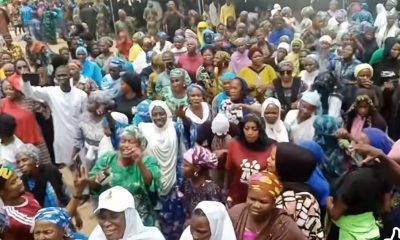
 metro1 day ago
metro1 day agoBREAKING: Senator Natasha defies restrictions, arrives homecoming rally by helicopter [VIDEO]
-
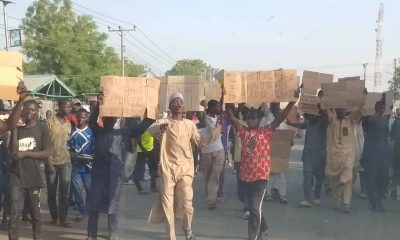
 metro2 days ago
metro2 days agoUromi: Edo residents flee towns over likely reprisal attack, arrest
-
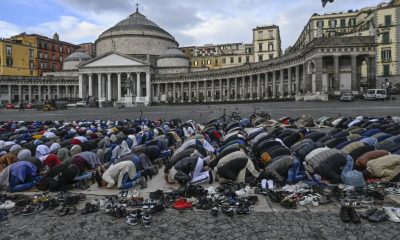
 International3 days ago
International3 days agoIn pictures: Eid celebrations around the world
-

 metro2 days ago
metro2 days agoBreaking: ‘Cancel your homecoming’ — Police tell Senator Natasha
-

 metro2 days ago
metro2 days agoHow they murdered my Kano-bound passengers in Edo
-
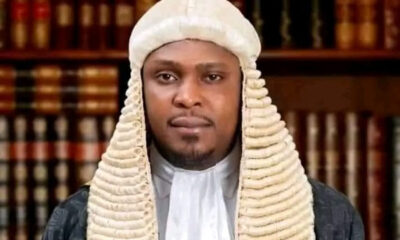
 metro2 days ago
metro2 days ago‘I was offered N5bn bribe to impeach Fubara’
-

 metro19 hours ago
metro19 hours agoBreaking: Tinubu sacks Kyari, appoints Ojulari as new NNPCL GCEO
-
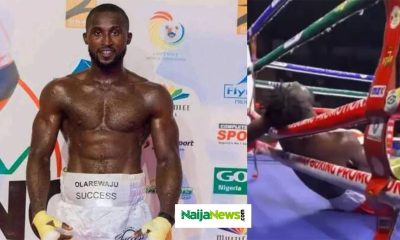
 Sports3 days ago
Sports3 days agoNigerian boxer collapses, dies in ring during fight in Ghana

